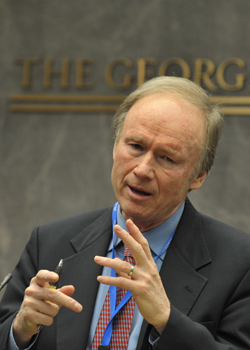Over the last few years, some scholars have become increasingly skeptical of the traditional ways in which experts have thought about copyright law. According to blogger Mike Masnick, the standard faith-based principle among policy makers—that “if some intellectual property is good, more must be better”—has held sway for a long time, without being questioned or tested. But recent empirical research done by Professor Chris Buccafusco—and others, including his colleagues Chris Sprigman and Paul Heald—suggests that more “one-size-fits-all” copyright protection might not always be better for innovation. By putting IP to the test, Buccafusco and others seek to revisit some of the traditional assumptions about copyright law, providing fresh analysis and possible reform.
A recent Columbia Journalism Review article highlighted Buccafusco’s approach and scholarship, noting that his findings suggest “that markets for creative work are not nearly as efficient as IP law assumes.” Click here to read the whole article, and be sure to check out some of Prof. Buccafusco’s empirical scholarship below.
See more of Prof. Buccafusco’s IP scholarship:
– Innovation and Incarceration: An Economic Analysis of Criminal Intellectual Property Law, Southern California Law Review (forthcoming 2014) (with Jonathan Masur)
– What’s a Name Worth?: Experimental Tests of the Value of Attribution in Intellectual Property, 93 Boston University Law Review 1 (2013) (with Chris Sprigman and Zachary Burns)
– Making Sense of Intellectual Property Law, 97 Cornell Law Review 501 (2012)
– Do Bad Things Happen When Works Enter the Public Domain?: Empirical Tests of Copyright Term Extension, Berkeley Technology Law Journal (2012) (with Paul Heald)
– The Creativity Effect, 78 University of Chicago Law Review 31 (2011) (with Chris Sprigman)
– Valuing Intellectual Property: An Experiment, 96 Cornell Law Review 1 (2010) (with Chris Sprigman)
– On the Legal Consequences of Sauces: Should Thomas Keller’s Recipes Be Per Se Copyrightable?, 24 Cardozo Arts & Entertainment Law Journal 1121 (2007 )



Leave a Reply